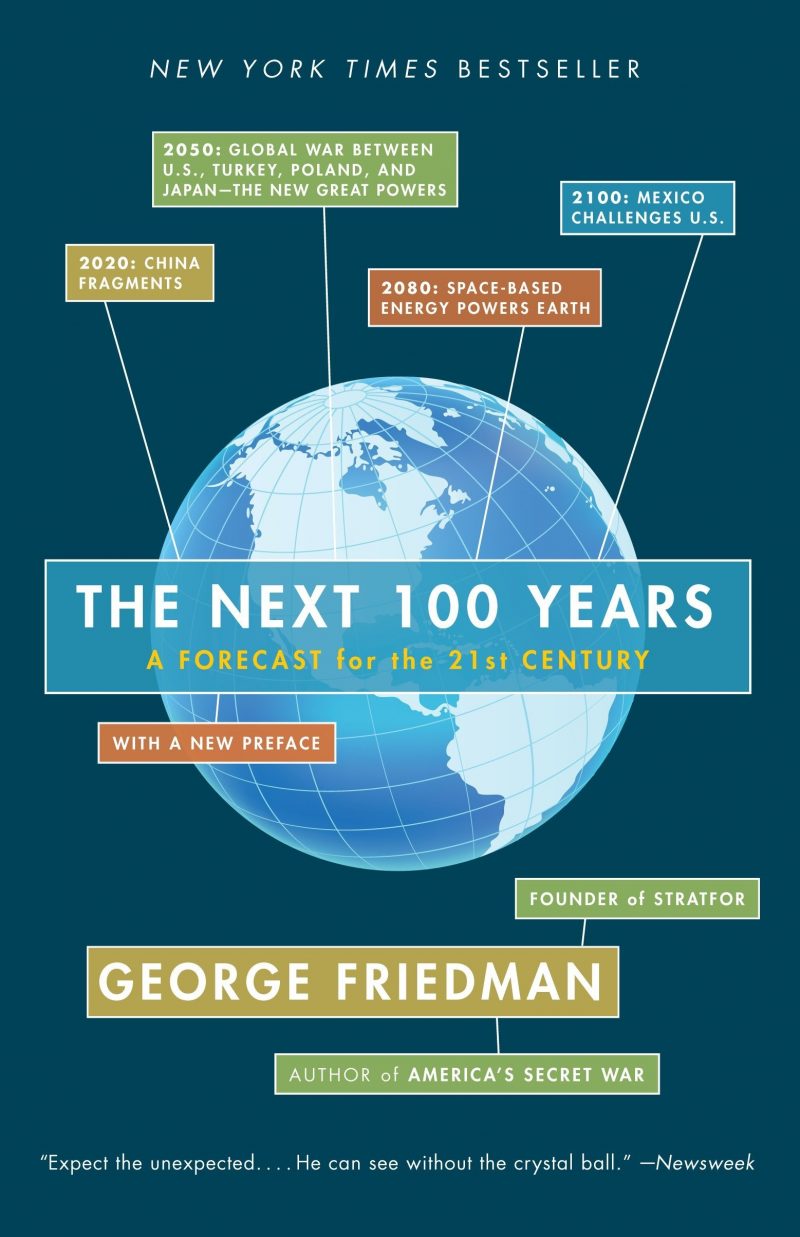“Think Tanks“ are official or private institutions of vital importance in the international policies of imperialist states. Thousands of institutions, from the Hoover Institute to the Smithsonian Institution, from the National Foundation for democracy to the International Relations Department of any university, create ideas to contribute to the state policy of imperialist countries. Perhaps the most vocal of these institutions in recent years is the Stratfor Institute, aka the “Shadow CIA”.
George Friedman, founder and President of Stratfor, is one of the US’ most important political scientists in the US. His thoughts are highly valued in American international policy circles. Friedman plays a role of a shadow secretary of state with his predictions and propositions for the future.
Over the past 10 years, Friedman has created controversy among political scientists with his two books on the future of the world. Their titles are “the next 10 years“ and ”the next 100 years”. Today, by quoting his book ”The Next 100 years”, we will take a look at the potential intentions of the United States for the next 100 years of the world and our region.

Although Friedman stated at the beginning of his book that he was not a fortune teller, he says that he has studied the economic and political periods of the United States over the last 200 years and made predictions for the next 100 years. However, he also rather ambitiously suggests that his predictions would come true more or less as he described them.
In the book’s preface, Friedman indicates that he is philosophically Machiavellian, and is referring to Machiavelli in almost every paragraph. Accordingly, he praises the Machiavellianism of former US presidents Abraham Lincoln, Franklin Roosevelt and Ronald Reagan. For example, Roosevelt’s statement that “rules are not sacred, but principles are” and Ronald Reagan’s statement that “we cannot play innocents in a world that is not innocent” are highlighted as definitional for his book
How dark is the economic and political future of the United States?
First, Friedman notes that the recession and economic crisis that have occurred in the United States for the last 5-6 years is not as deep as everyone thinks, and is one of the periodic crises that recur every 50 years. He says that compared to the crisis of 1929, today’s crisis is quite bearable. He even suggests that the United States will come out of this crisis much stronger, and that due to the collapse of Europe, it will continue to exist as the most powerful country in the world.
Friedman advises US Presidents to act Machiavellian and use regional powers instead of taking a direct role in regional crises. In a sense, he wholeheartedly supports the policies that Obama applied in using Turkey as a US subcontractor as a means of pressure on all Middle Eastern states, especially Syria. As a general policy rule “the strategic goal of the United States should be to prevent the emergence of any power that can challenge the power of the United States in any corner of the world.”
According to Friedman, future US Presidents must identify the most dangerous enemies and create the necessary coalitions to respond to them as a requirement of foreign policy. According to Friedman, “as a matter of realistic policy, America should review all the institutional relations required by the days of the Cold War, but which are now beginning to stand in the way, and even get rid of organizations such as NATO, the IMF and the UN. Because these institutions are both inflexible and incompatible with the political realities required by the day.”
According to Friedman, the 3 most important things to do in world politics are:
“1. Ensuring that regional energies are consumed in their regions to keep threats around the world away from the United States.
2. By creating alliances with regional powers, the United States should ensure that these allies bear most of the burden in regional conflicts. The United States must support these allies with promises of economic, military technology and, where necessary, military “intervention.”
3. the US must pursue military interventions in situations where only regional allies can no longer deal with these regional problems.
The end of the Jihadist war against the US
In this book, Friedman makes the following comments and predictions that concern our world about the jihadist war with the United States in the first 20 years of the 21st century:
“As the war between the United States and jihadists, since September 11, 2001, approaches its end, the first line of defense against Islamic radicals is the Muslim countries themselves. Because of this, these Muslim countries are trying to crush al Qaeda with all their military and intelligence forces.
As long as Al Qaeda loses, the U.S. wins! An Islamic world in chaos, an Islamic world incapable of unification, is a situation that the United States has achieved its strategic goal. Since 2001, the United States has done everything to create chaos in the Islamic world, and it has accomplished it. Of course, in this process, it created hostility towards the United States in these countries. But these regional earthquakes did not cause regional superpowers to emerge! In fact, this region is much more divided than ever, and this is how it looks to be ending this era. As long as Muslims fight each other, the United States is considered to have won this war.
Of course, this does not mean that a nation-state in the region will not turn into a regional superpower and threaten the interests of the United States. Turkey is the most powerful state in the past of this region and is rising again.”
China in the 2020’s: three possibilities and one outcome
Considering China’s current course, George Friedman notes that he sees a 3 possible futures and says:
“In the first possibility, China will forever continue to grow at today’s astronomical rates. No country on earth has been able to do this before, and China will be no exception. The second possibility could be China’s re-centralization. Given the current situation, the re-centralization of a central government, including those who have interests in decentralization, can be problematic. The third and most likely scenario is that China will break up along traditional regional borders as a result of an economic crisis, or regional governments will gain weight. This will put China in a pre-Mao position. But despite all this, China does not create a geopolitical earthquake line in the next 20 years.”
2020’s: Russia loses and disintegrates in the Second Cold War
Friedman is pretty pessimistic about Russia’s future. He says about the next twenty years:
“In the mid-2010s, the United States will be obsessed with Russia again. And it will try to tie Russian hands without going to war with Russia on this issue. In any case, Russia’s military might will be significantly melted down against the United States. Poland, Romania, Hungary and the Czech Republic will do everything to prevent the Russian advance. Because of these, Russia’s military power will be destroyed immediately after 2020.”
2030’s and beyond
“Due to an aging and declining population, the U.S. economy will face a major crisis in the 2030’s, and immigration policies will have to be reorganized and a significant number of immigrants will be accepted in the United States. Because of this, the 2040’s will be the scene of a major economic breakthrough. This trend will last until the great crisis in the 2080’s.
The breakup of Russia in the early 2020’s will make Eurasia a “hunter’s Paradise”, and Eastern European countries led by Poland from the west will hunt in the west of Russia; Turkey from the south in Kafkas and even further north, and Japan from the East in Siberia. In this movement in the 2020’s, Turkey, Eastern Europe, and Japan will become allies of the United States. NATO will disappear because of the reluctance of Germany and France to protect the Baltic states against Russia.”
Rising Eastern power: Japan
According to Friedman, once the integrity of China and Russia is compromised and even eliminated, new powers will replace them. These will be Poland, Turkey and Japan. In the East, Japan will establish activity in an important region of China due to the need for land, the need for raw materials and, more importantly, the shortage of labor provided by the aging population. This will be in the form of investments and technology transfer. In addition, Russia will also want to establish control over the Pacific Ocean region.
New alliances for a New World
“Korea, which will be united long before the 2030’s, will be in the top 10 in the world economy and will approach the United States in the face of the rise of the Japanese. With this approach, the anti-Japanese coalition will begin to take shape. Beijing’s efforts to reunite China will ensure the U.S. support of China against the rising Japanese.”
Eurasia’s new player: Turkey in the 2020’s
According to Friedman, against the Russian advance in the Caucasus, in the 2020’s, Turkey will enter the northernmost part of the Caucasus to secure its North and secure this region. Meanwhile, the Arab world is divided on every imaginable issue. Since Turkey’s attack against Russia will be very useful to the United States, the United States will support Turkey in its progress in the Caucasus and help it be effective in Muslim regions of the Balkans and Arab countries in the South. In particular, the development of Turkey’s naval forces will support the creation of a force against the Russians in the Mediterranean and Black Sea.
This US-Turkey friendship developed against Russia will be reversed as the 2020’s end. Because although the United States supports regional powers in regional problems, as a strategic policy, it wants to prevent the emergence of major regional powers here. Turkey, on the other hand, will come to a more Islamist and radical political agenda against this changing strategy of the United States.
New player at Eurasia’s west gate: Poland
According to Friedman’s analysis, in the 2030’s, the country that will benefit most from this situation during the breakup of Russia will be Poland. It will want to use Belarus and Ukraine, which immediately opens to the East, as a “cushion” against the Russians. Along with Poland, Hungary, the Baltic states, Romania and Slovakia will form an alliance and expand to the East, without any resistance. By the 2040’s, the balance of power in Europe will shift to Eastern Europe. The reason for this is that economic dynamism has stopped in Western Europe, and population decline has led to a crisis here. Eastern Europe will be more advantageous in these two ways. France and Germany, who have never made peace with the United States, will be fighting for life in the 2040’s.
Map of the world in the 2030’s
With the strengthening of China’s local governments in the 2010’s, China will be heading towards disintegration. In addition to this, Russia’s disintegration in the 2020’s will create a vacuum from the Pacific to the Carpathians. In this gap, Finland will take Keralia, Romania will take Moldavia, while India will ensure Tibet’s independence. Even Taiwan will increase its influence in mainland China with the help of Westerners. By the mid-2030’s, three countries will be at the peak of their power and will start to worry the United States: Turkey, Japan and Poland. Of these, Turkey and Japan will pursue a policy of direct hostility with the United States in the 2040’s.

















Leave a Reply